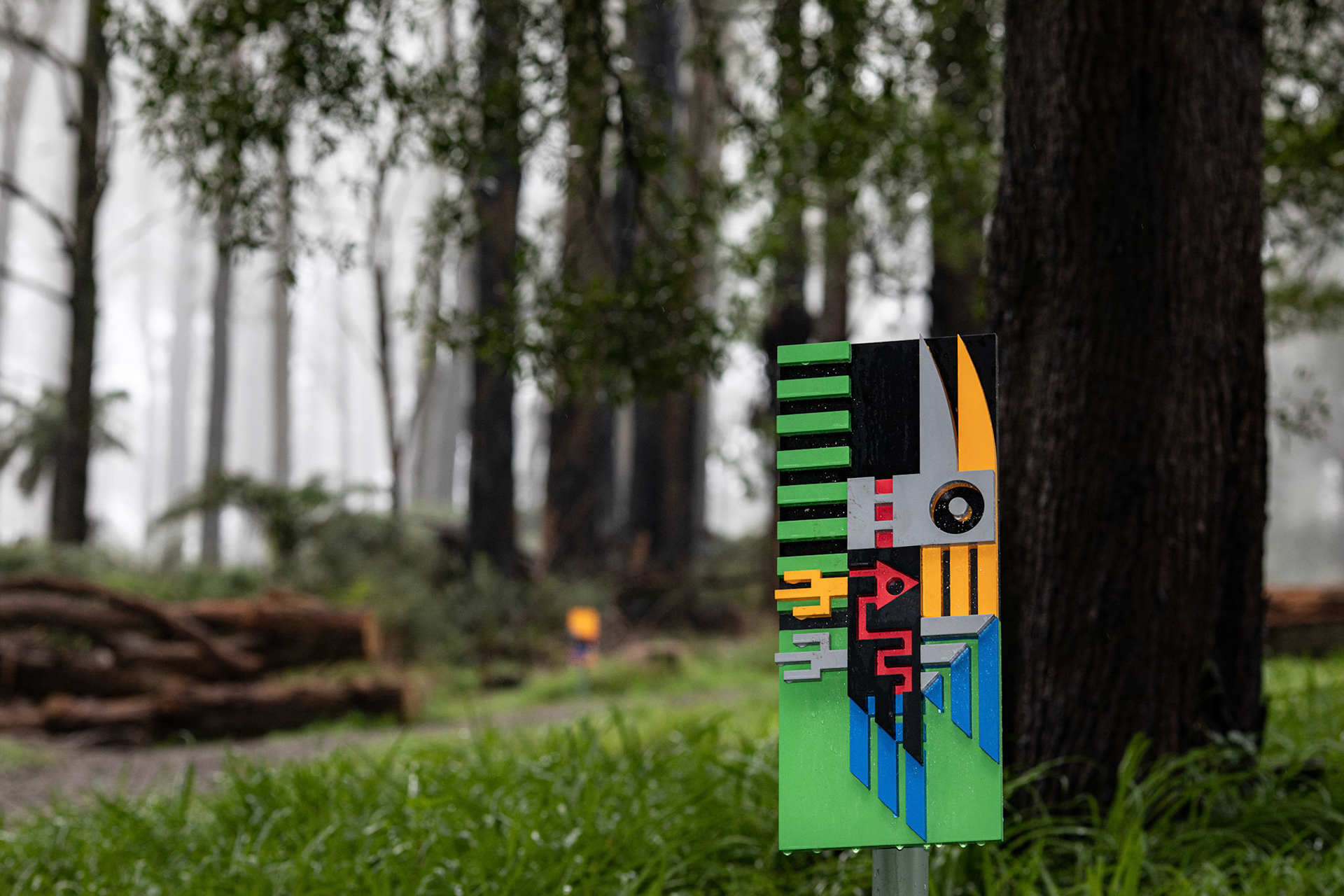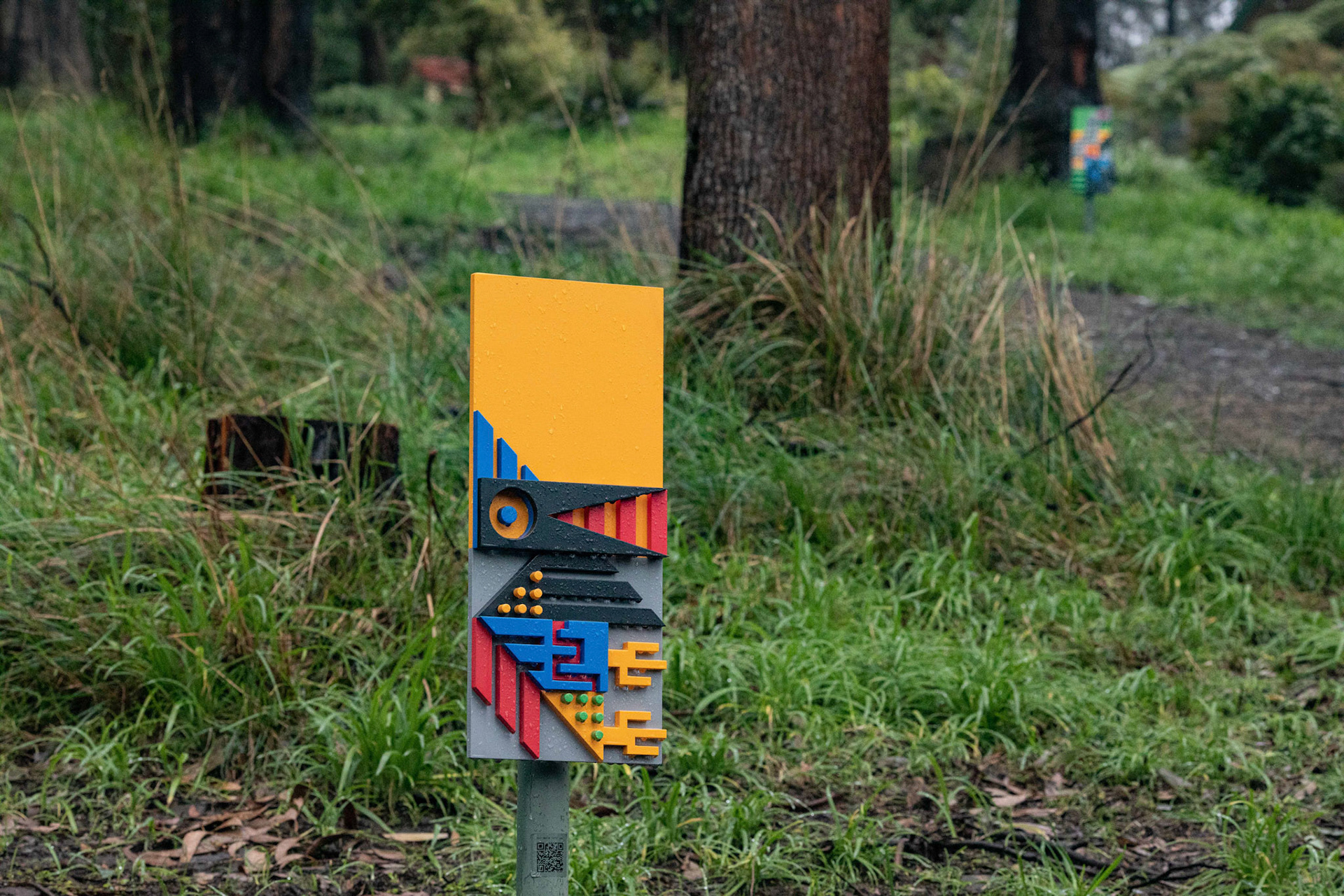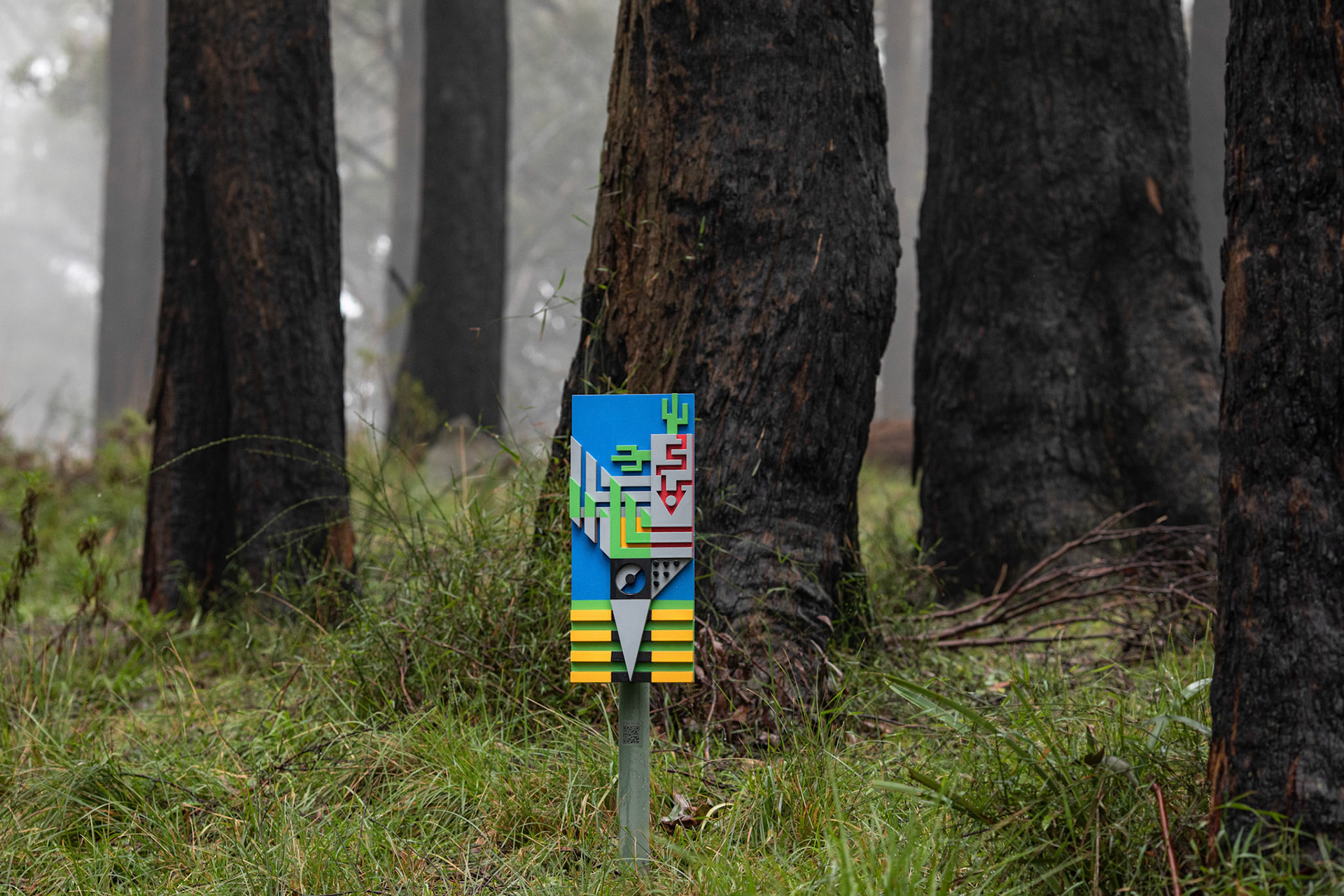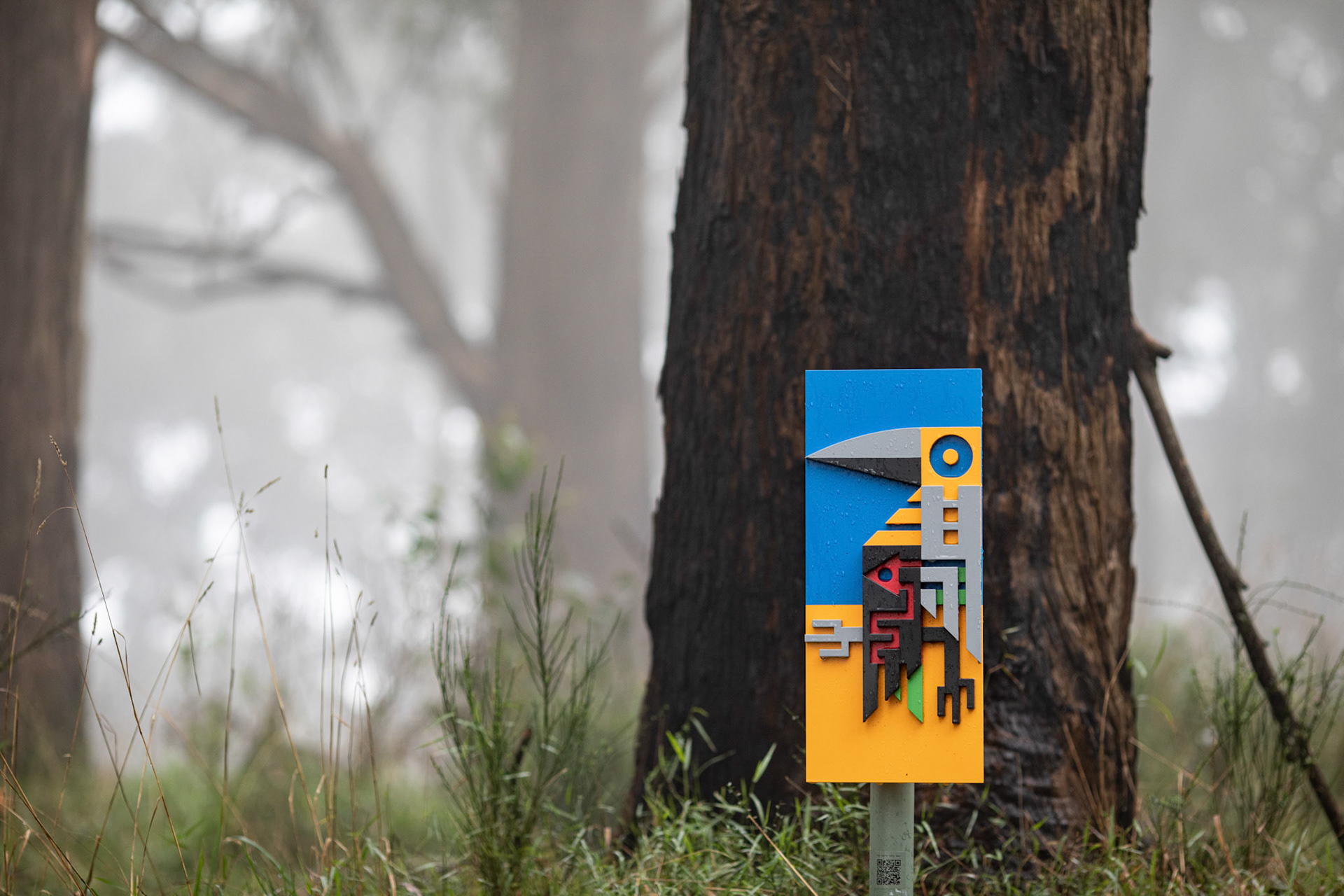Please consider voting for me in the October Yarra Ranges Council elections.
• Representation with integrity, honesty and compassion
• Proactive approach to climate change
• Leadership in AI for council services
• A vibrant local culture and business
Like many in Lyster Ward, I've called this place home for years, raising my son and actively engaging in our community's arts, environment, and storm recovery efforts. I'm an award winning artist and academic, and my research in computer music was awarded a Eureka Prize for innovations in computer science. The Council is trialling AI technology to speed up access to council processes. I can see great potential here but I understand the concerns this technology raises and I have the knowledge, experience and wisdom to oversee this on your behalf. In Lyster, we all experience the impact of climate change, and it's been a major theme in my work. As councillor, I will bring this engagement to the task of planning for, and making possible, a sustainable future for the Yarra Ranges. I will work to support social wellbeing and culture, and as an artist running a small business, I want to see a thriving local economy. Through fires, storms and pandemic, we have shown that we can work together to make our place our home. Please join me in making a future where we belong and flourish in our beautiful part of the world.
I am inspired and guided by the United Nations Declaration of Human Rights.
Contact: Peter@McilwainForLyster.au
my artwork on the parklet in front of the Black Bee in Belgrave. You can explore my artistic practice at: https://bentnail.art
Integrity, Honesty and compassion
Democracy is where we make decisions together for everyone's benefit and the better we are informed the better decisions we make. As a candidate I want to create a conversation between you and I that is honest where I don't make promises or commitments that I can't keep. Where I keep you informed so we focus on finding the best solutions with creative drive, compassion, collaboration, information and intelligence. If elected I'll commit to working with integrity using my talents to represent you as best I can. This means that I value honesty and doing the right thing over personal gain.
For me compassion is a core virtue and it's a critical response that checks against biases and limitations that can happen when problem solving is focused only on rational thinking. A solution to a problem must be logical if it's going to work but getting the best solutions for our community requires compassion as well. I believe that the virtue of compassion also means an obligation to give everyone dignity in how they are treated and how they live.
Lack of trust is now a serious problem in our democracies and this is reflected in the way many people in the community have spoken about our council in the conversations I've had as a candidate. I want to make an effort to do things to change course. Around the world people have been developing participatory democracy as a way of bridging this trust gap. It has been shown that if people feel they are listened to (in a real way) and that they have a voice, much clearer communication can occur between government and the communities they serve. It's proving to be a very successful way for communities to reach a better understanding of relevant issues that incorporates multiple points of view. This leads to better outcomes in decision making and greater trust. It's about making our differences work for us rather than dividing us.
That's why councils are now required by the Victorian Local Government Act 2020 to incorporate community engagement in their processes and I will working to see these processes happening more effectively our community.
For a good overview of participatory democracy or citizen engagement see:
Proactive approach to climate change
When speaking with many in the community it's obvious that the big concerns are with things like bad roads, bad drainage and blackouts. I believe the council should work to fix these things immediately but we shouldn't loose sight of the fact that if we only focus on immediate responses and don't plan for and resource response to the effects of climate change, we might compromise our ability to respond in the future. We are already experiencing this in relation to storm water management, it could have been planned for in the past but because we are playing catch up we are having to put in major infrastructure to deal with large rainfall events causing us to fall behind on the immediate responses. The major storm two years ago is still having impacts on the council's budget and we know that more storms like this are coming.
Right now though it's not clear what the impact of increased adverse weather will have our capacity to respond. Being prepared means planning for the future and finding the resources needed to respond. We need to work together with council to address these challenges to find solutions that keep council services running well now and into the future. Working together means that we should continue to alert the council to problems, it means community discussion and planning for response to weather events. Pushing the council to do more on mitigation planning and in reporting on its progress. It might mean forming consensus around community solar for shopping centres and streets where houses are shaded by our beautiful tall trees. It might be any number of practical solutions that help us make a sustainable local economy. As councillor I will be interested in providing the resources and expertise of council to facilitate community dialogue that leads to action.
Leadership in AI for council services
Councils are now trialling AI technology to improve services. It is a significant step, but it is important that it's implementation is handled well and overseen by people who understand this technology. As an academic who has researched and worked with the core technology of AI, I have a good idea of what it is, what it can do, and how it might develop in the future.
Each day, the process of local government involves working with reference to a large body of rules, regulations, guidelines, and policies. Finding the specific rule or policy that is relevant to a situation requires members of the public to do research and/or consult specialist staff. Likewise people working in council must continually think with the regulations in the forefront of their minds. This means that problem-solving tends to focus on bureaucracy and can dampen more flexible, creative modes of thinking.
AI technology has the potential to significantly improve access to this body of information using everyday language. This can save time and make complex knowledge more accessible to a wider range of people, including both council staff and members of the public. While barriers to AI adoption and use still exist, this technology represents a substantial improvement in information accessibility compared to traditional methods.
As someone who makes use of AI every day for research, idea development, and software code writing, it extends what I am able to do and lets me focus more on the creative overview and less on the detail. I can see many ways AI can improve the working experience for council staff and for the public that interacts with them as well as saving time and money. If we use it well and ethically, it can open up possibilities for better governance and service provision.
A vibrant local culture and business
Lyster Ward is a great place to live. It has great natural beauty and biodiversity, with strong cultural elements that support and enrich local businesses. It's also a great place to visit for the same reasons. A strong local economy in Lyster comes from the interaction between all these parts, supported by council services and shaped by the relationship between the people of Lyster and their council. One of its great strengths is the cooperative culture that has developed, which stems from people feeling a sense of belonging.
However, there are challenges in the future due to the economic impacts of climate change and a relatively fixed population size of the ward, which limits the capacity to expand our economic base. This means that we have to focus on what makes the region successful and adopt smart strategies that make the most of what we have while also bringing in money and resources from outside the region. With Melbourne's population set to grow significantly over the next few decades Lyster Ward will likely be a destination for visitors and we need to be across the opportunities and challenges this presents.
I see the role of councillor here as facilitating an ongoing discussion in our community about how we maintain and rejuvenate our cultural and business sectors. At the same time, it involves keeping in touch with immediate needs while working together to develop viable, smart, sustainable strategies for the future.
What is your vision for the municipality of Yarra Ranges Council?
A council and community that has the information and resources necessary to address the impact of climate change now and in the future utilising innovative and practical solutions and best practice in technology, resources and management. A supportive society where difference is valued and where we flourish culturally and economically.
What expertise or attributes do you have which would help you in undertaking the role of Councillor?
As an engaged resident, I have strong connections to community. As a father and musician, I listen. As an artist and academic I can tackle challenges like climate change with excellence in innovation, creative thinking and collaborative research in arts and science including knowledge and experience with AI technology.
More Info about Me
Basic Information:
- I have never been member of any political group
- as a candidate I haven't received any donations (so far) if a donation was offered I would follow the guidelines given to candidates in the Victorian Electoral Commission Handbook
- my campaign is solely funded by myself
- I have never been member of any political group
- as a candidate I haven't received any donations (so far) if a donation was offered I would follow the guidelines given to candidates in the Victorian Electoral Commission Handbook
- my campaign is solely funded by myself
- I have lived in Lyster Ward for about 20 years (although I was considering running in Streeton which runs very close of where I live)
- I have working on the Hills Storm recovery Committee, I’ve a member of the Birdsland interest group, I have also been an executive member of the Australasian Computer Music Association for many years and was President of that organisation for around 3 years
- I have been awarded several grants and commissions from the council to create public art works and community arts projects. All grant money has been acquitted with council (this means that all expenses have been accounted for and that the council signed off on this accounting)
- climate change is a scientific fact and it is having direct impacts on Lyster Ward now. Councils must provide basic services while at the same time plan for the impacts of climate change so that it can continue to provide those services in the future.
- climate change is a scientific fact and it is having direct impacts on Lyster Ward now. Councils must provide basic services while at the same time plan for the impacts of climate change so that it can continue to provide those services in the future.
- if elected I will be focused on the issues affecting the Yarra Ranges with issues directly affecting Lyster as a priority. - if elected I will push for better and more specific reporting of council activities (for example having the ability to see resources are allocated on a ward by ward basis) a model for this might be the reporting hub that is used by Frankston Council: https://data.frankston.vic.gov.au/pages/home/
- if elected I would prioritise basic council services however in the Yarra Ranges a simplistic focus on basics would not be successful over the longer term and many factors must be taken into account when allocating expenditure.
- if elected I would prioritise basic council services however in the Yarra Ranges a simplistic focus on basics would not be successful over the longer term and many factors must be taken into account when allocating expenditure.
My Research on Lyster Ward
1) did you know that you can get a ton of census data on our area at: https://profile.id.com.au/yarra-ranges
Some interesting points;
a lot of the demographics (age groups, occupations, types of households etc) of Lyster seem to be remarkably equally distributed. For occupations for example there are about the same number of tradies, business owners, professionals and other groups (although professionals are a bit bigger as a group). The same goes for age groups, types of households (people living alone is bigger that one would have liked 10 to 20%), education. What this means to me is that no one group dominates. So when we think about whats good for Lyster Ward its worth keeping in mind that an individual perspective about "what the council should do" is one of many perspectives that are likely to be different because of the range of lifestyles we have here.
There are two exceptions to the flat demographics: ethnicity - dominated by Europeans (but I've seen this slowly changing) and the number of years people live here - the dominant group is people living 10+ years (in my case it's 20). This tells me that we Lysterians love where we live and probably care about the long term which means addressing climate change and having a thriving local scene (markets, local businesses and culture).
2) the ward boundaries have changed and you can find out about this at: https://www.vec.vic.gov.au
where you can find information about the election including how it works - you'll get a voting package in the mail.
3) If you do a little digging on the VEC website you can get a KML file of the ward boundaries. If you are a map nerd like me you know what this is (you can load it into google and zoom right in on the detail) - assuming you aren't a map nerd, I've included the map above.
Some interesting points re whats part of Lyster: half of Lysterfield Lake, Montague Farms (big apple producers), most of Puffing Billy, the ward runs runs next to Aura Lake, includes parts of Sherbrooke, and Monbulk Aquatic Centre, and Burrinja is now part of Lyster. Also the lowest part is where Lysterfield Rd crosses Monbulk Creek about 100m and the highest part at 500m is the intersection of Mt Dandenong Tourist Rd and Sherbrooke Rd.
4) Lyster was home to one our most significant artists Fred Williams (his work is held in places like the Tate in London). He has many works with Lysterfield and Upwey in the title (Upwey Landscape is in the Tate btw). Kallista was home to Tom Roberts another major painter and just up the road Arthur Streeton lived in Olinda (which is Streeton Ward named for obvious reasons). Currently the council is involved in developing ngurruk barring (previously called Ridge Walk) which is linking cultural sites together in a network of trails across the shire. This will incorporate all kinds of cultural elements including the long history of First Nations culture. I'm proud to say that my artwork Pathmarker Birds is currently installed at the start of ngurruk barring in Birdsland and it's very gratifying that people enjoy the work. So with the weather fining up maybe you might like to take the walk (between McNicol's Rd and the picnic area) and contemplate on the cultural and natural richness and diversity that we a lucky to live in.




Authorised by Peter Mcilwain, PO Box 1221, Upwey VIC 3158